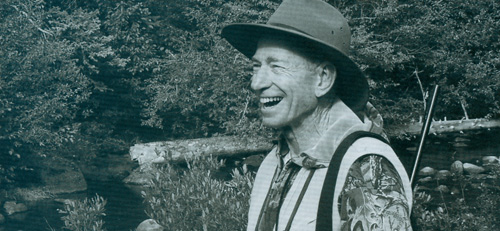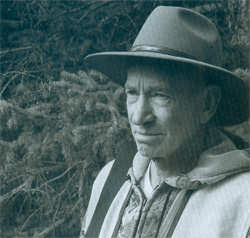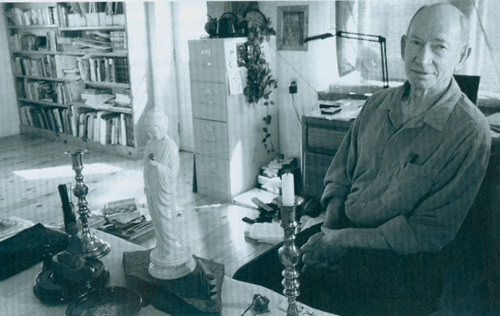
In the tiny western Colorado town of Paonia, a weekly Buddhist meditation circle includes a carpenter, an editor, a metal worker, a photographer, and as it so happens, the father of conservation biology. When the meditation periods conclude, it is the biologist who often asks, only half in jest, “Did anyone get enlightened” Even in the pursuit of nonself, Michael Soulé can’t entirely escape his ambition, which has driven him all his life.
His ambition served him well through several professorships, through founding a discipline with the unabashed aim of saving the ecosystems it analyzed, and through co-founding an environmental group that aims to reestablish large carnivores over much of North America. No scientist has done more for the cause of reserving biodiversity than Soulé, according to Stanford University ecologist Paul Ehrlich, who was Soulé’s graduate school advisor in the early 1960s. Nature writer David Quammen calls Soulé a theoretical “wizard.” But these days, Soulé’s ambition is softening into something like aspiration. And he’s broadening the boundaries of his inquiry to include, well, everything.
“Scientific inquiry leads to the conclusion that everything is connected,” said Soulé, a trim, sharp-featured man wearing jeans and a battered cowboy hat. He could be defining karma itself when he talks about ecology, which he considers “the most profoundly connective discipline in biology: When you push one place, the effect can cascade throughout an ecosystem and end up in unpredictable changes somewhere else.”
This dynamic extends beyond the confines of the natural world.
“When we look for ways to stop the extinction crisis, we keep coming up against problems like greed,” he said. “Most people feel they live in a world of scarcity. They feel if they are too generous, they won’t have enough for themselves; that happiness is the reward of self-indulgence.
And yet people who have thought deeply about it and have experimented with simplicity—as the Buddha did, and as Thoreau did—find that it’s the opposite: Happiness comes from generosity and living simply.” This may sound alarmingly simple coming from a man who spent most of his career penning articles with titles like “Normative Conflicts and Obscurantism in the Definitions of Ecosystem Management,” but Michael Soulé has always gone beyond his own designated intellectual turf. Here is a practicing Buddhist who not only hunts but also doesn’t understand why all nonvegetarian Buddhists don’t do so.
“Buddhism is not a doctrinaire, fundamentalist religion,” he said. “So I take this as license to really investigate what non-harming is.”
Soulé spent his youth absorbed in nature. In the 1940s and ’50s in San Diego, he chased lizards and collected butterflies in the canyons that branched through the city. In his teens, he joined a club of junior naturalists associated with the San Diego Natural History Museum. They took field trips to the deserts and mountains of southern California and over the border into Mexico.
“I had an idyllic adolescence,” he said. “I had charts of the lowest tide tables. I’d walk over to the coast and get abalone and lobsters. The water was clean.” But that ended. “I saw San Diego destroyed by developers,” he said. “I think that’s what makes lots of people conservationists—seeing a place you love bulldozed.”
His alarm about the state of the natural world incubated during his graduate school years at Stanford, where he studied under the discomforting tutelage of Paul Ehrlich, author of the 1968 opus The Population Bomb.
Soulé became an authority on the extinction of animal species. During his first university teaching job, in the African nation of Malawi, he witnessed the ecological consequences of a burgeoning human population. Back in the United States, he watched development continue to destroy landscapes, and he studied how animal populations become more fragile when they are fragmented. Unable to indulge in denial, which he considers “the most common coping mechanism in the world,” his vision for the future of the planet took a turn toward the apocalyptic.
“In our lifetimes, this planet will see a suspension, if not an end, to many ecological and evolutionary processes which have been uninterrupted since the beginnings of paleontological time,” wrote Soulé and fellow scientist Bruce Wilcox in 1978. The aim of the embryonic field of conservation biology would be to steer events toward a less dire alternative.
At the time, for a researcher to proclaim such a proactive stance was virtually unheard of. As Greg Hanscom wrote in the Western environmental journal High Country News, Soulé had “concluded that he could not sit back and be an ‘objective’ scientist while the natural world went to hell.”

Soulé’s message—expounded in books like Conservation Biology: An Evolutionary-Ecological Perspective—has resonated with conservation-minded students all over the world for more than twenty years.
“Throughout graduate school, I was given the message that as a scientist I should not be governed by my emotions or my sense of what was right or wrong, or even my sense of beauty,” said Dev Carey, a Paonia resident and Ph.D. ecologist who attended graduate school at UC Berkeley and the University of Arizona in the late ’80s and early ’90s. “What Michael was able to do was talk about something he cared about, but do it in such a logical and scientific way that no one could question him.”
Soulé’s urgency was fueled both by his personality—”If something’s wrong, I should take responsibility for it”—and his knowledge of the realities of extinction. Referring to habitat destruction and the virtual impossibility of the emergence of new species on a fragmented planet, he wrote, “It’s not death I mind. It’s the end of birth that bothers me…and we are precipitating the greatest wave of extinction since the extinction of the dinosaurs.”
This is not lighthearted stuff. When Soulé walked away from a tenured full professorship at the University of California at San Diego to move to the Zen Center of Los Angeles in 1978, it may have looked like he had stared into the environmental abyss for a few beats too long.
But that wasn’t it. It was personal. Soulé had simply had enough of the academic grind. Professional success hadn’t brought with it the promised happiness.
“Here you are, you’ve accomplished what you want: You’ve got your degrees, a position at a prestigious university, nice kids.” Soulé and his pediatrician wife were raising two sons and a daughter in a household so biologically brainy that they spayed their cats at home.
“But getting a grant just doesn’t do it; publishing a paper just doesn’t do it,” he said. “You look at your colleagues. Are they any happier than the Samoans or the villagers in Africa? The answer is no! They’re less happy. They’re driven and competitive and overworked and anxious.
“I decided Buddhism was the way for me. I was in touch with dukkha, the inevitability of pain and suffering in our lives. At the time, I thought Buddhism would end my anxiety.”
It didn’t. He meditated during his stay at the Zen center, but the spiritual life didn’t take the first time around.
His wife, however, took to Buddhism like a fish to water. They parted ways. She eventually became the abbot of a Zen monastery in Oregon. Soulé plunged back into academia, taking a position at the University of Michigan. He wouldn’t meditate again for eighteen years.
But his life didn’t become conventional. In 1991 he teamed up with former Earth First! founder David Foreman to create the Wildlands Project, a group that aimed to combat ecosystem fragmentation by linking up continuous habitats for large predators like bears, wolves, and mountain lions throughout North America. The underlying vision was based on decades of research by Soulé and others: Large predators are wonderful caretakers of ecosystems. They smooth out the spikes and valleys in numbers of deer, elk, and moose, thereby preventing overgrazing. This, in turn, prevents habitat destruction and cascading extinctions.
Just as the advent of conservation biology shook up the academic mainstream, the Wildlands Project aimed to shake up the conservation status quo. It gave itself a century to reconnect the necessary habitats. It wanted to get environmentalism at large to think beyond immediate crises and refocus on ecosystem healing.
But the Wildlands Project was often seen as haughty and uncaring. Foreman would take his show on the road and, in a presentation that hummed with Old Testament fervor, flash a slide of a lion eating an antelope, announcing that “the Wildlands Project is about big cats and blood.”

This kind of approach was popular with undergraduates and urbanites, but it went over like a lead balloon in rural communities like Delta County, Colorado, which is where Soulé moved six years ago. He’s softened his opinion of rural Americans since then. He taught waltzing and contra dancing at the Hotchkiss Town Hall with Joy McKinney, his second wife. He irrigated his land. And he started meditating again, often traveling to Oregon to study with his Buddhist teacher, Jan Chozen Bays, who is, Soulé acknowledges with an ironic grin, his first wife.
This intellectual, with his suitcases of awards, fit right in with his neighbors in two ways. First, he had an old pickup truck. Second, he hunted. He’s shot half a dozen animals since he started hunting in 1994. Last fall, he downed a buck deer with a single shot through the lungs. It died within a minute.
The obvious question is, how can a Buddhist who believes in the precept of non-harming—which Soulé does with all his heart—take aim at a buck and shoot it through the lungs?
Soulé is of two minds: On one hand, it’s no fun to watch an animal die. On the other hand, the Buddha lived in a simpler time, when the environment wasn’t so degraded by humans, and humans weren’t as aware of how the environment functioned. And in the midst of today’s extinction crisis, non-harming is synonymous with preserving biological diversity. For example, the removal of top predators from most ecosystems has caused skyrocketing populations of herbivores, with disastrous ecological consequences in many parts of the country. One of the most dramatic examples is in the northern reaches of Yellowstone National Park, where elk have eaten all the aspen saplings and virtually eliminated willows. This resource depletion has driven away beaver, which build dams on rivers and streams, creating habitat for pond species and controlling floods. The wolves reintroduced to Yellowstone in 1995 are already tempering this damage, but the rest of the country is not so lucky: Birch, yew, and oak forests are struggling because their seeds and seedlings are being consumed before they can grow.
So, the way Soulé sees it, it’s preferable to put a dent in the exploding populations of deer and elk rather than to eat industrially raised cattle, whose production requires enormous amounts of land, corn, water, and petroleum. The unnatural diet and crowded conditions on feedlots necessitate the use of large amounts of antibiotics and hormones, which stay in the meat to the detriment of the consumer.
“If by killing we’re enhancing diversity, then indeed that obligates us to kill,” said Soulé. “It may sound kind of weird, but Bob Thurman, in a recent article in Tricycle, said something along those lines, too. He said that ‘surgical violence’ can be part of the bodhisattva ethic.”
But why doesn’t Soulé give up eating meat entirely? Wouldn’t that protect biological diversity better than hunting?
Not necessarily, he says. Modern agriculture gobbles up huge amounts of land and water—habitat that would be better utilized for wildlife, including escalating numbers of endangered species—from prairie mole crickets to sage grouse and grizzly bears.
“I think that everyone should try to eat ethically, to minimize one’s footprint on the earth,” he said. This entails becoming an educated, discerning consumer.
“There is painfully little on restaurant menus that one can eat in good conscience,” said Soulé. “Shrimp is out; most fish are either toxic or endangered; chicken, veal, beef, and pork either suffer physical and emotional pain from the practices of industrial agriculture, are adulterated, cause environmental problems because of long-distance shipping, push small farmers off their land, or externalize the habitat destruction by pushing production overseas. It is more ethical to eat local grass-fed beef, for example, than to buy supermarket organic vegetables and fruit grown in Chile or New Zealand if one considers only the greenhouse gases released by their transport and refrigeration. Ideally, most of our food should be grown within fifty miles of our home and should be organic or free-range.”
But Soulé believes that moderate changes in one’s eating habits—eating less meat, eating more local produce—are more sustainable than becoming an overnight vegan, burning out on that, and reverting to an unconscious diet.
The latter is a real danger. Our national character, Soulé says, gravitates toward purity or ideology: “Capitalism, fundamentalism, Puritanism, veganism. The problem this creates spiritually is the ‘Us versus Them’ dualism, which is a kind of spiritual materialism: ‘I’m purer than they are. I’m the purest person in this room.’
“It’s so clear to me that all global conflicts and problems—environmental, economic, social justice, peace, animal welfare—are exacerbated by dualistic thinking, the unique mental disease of our species. We humans embrace polarization as if it were better than sex. Take a close look at any social movement. Internal struggles predominate. Usually, the purists are fighting with the pragmatists. Animal rights advocates hate animal welfarists, conservationists dismiss the promoters of sustainable development, and vegans disparage vegetarians. When I look around, I see fundamentalism all the way down.
“We Buddhists are fortunate that only one canon—the Pali canon—survived. Otherwise, we would probably be plagued by internecine conflict as harmful to the world as the hostility among Judaism, Christianity, and Islam.”
Soulé knows what he’s talking about. His scientific training steeped him in Us vs. Them thinking. Scientists interact by sparring intellectually. “They’re trained to criticize, to find the flaw in the argument,” he said. “That puts you in a reactive, hostile state of mind.”
It’s just what he’s working to undo. By meditating an hour a day, by trying to see the validity in the viewpoints of all “life-affirming” movements, by hunting while it’s still ecologically viable, he is working his way toward a less exclusive, more flexible, and softer state of mind.
But when wolves are re-established in Colorado—which Soulé thinks could happen within a decade, and about which he is immensely happy—he believes that hunting elk and deer may no longer be necessary or ethical.
“I may be reduced to eating roadkill,” he said with a smile.
Thank you for subscribing to Tricycle! As a nonprofit, we depend on readers like you to keep Buddhist teachings and practices widely available.